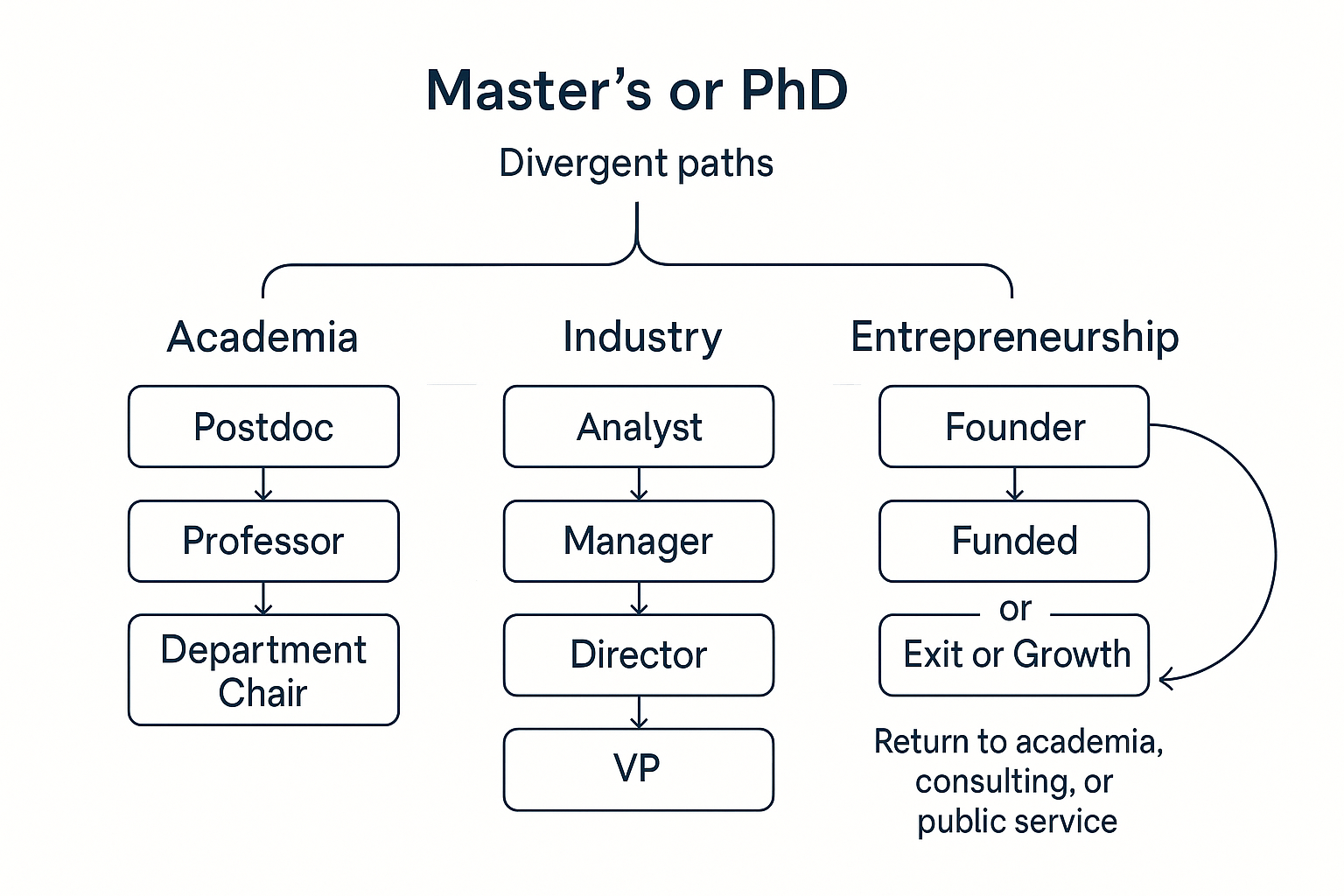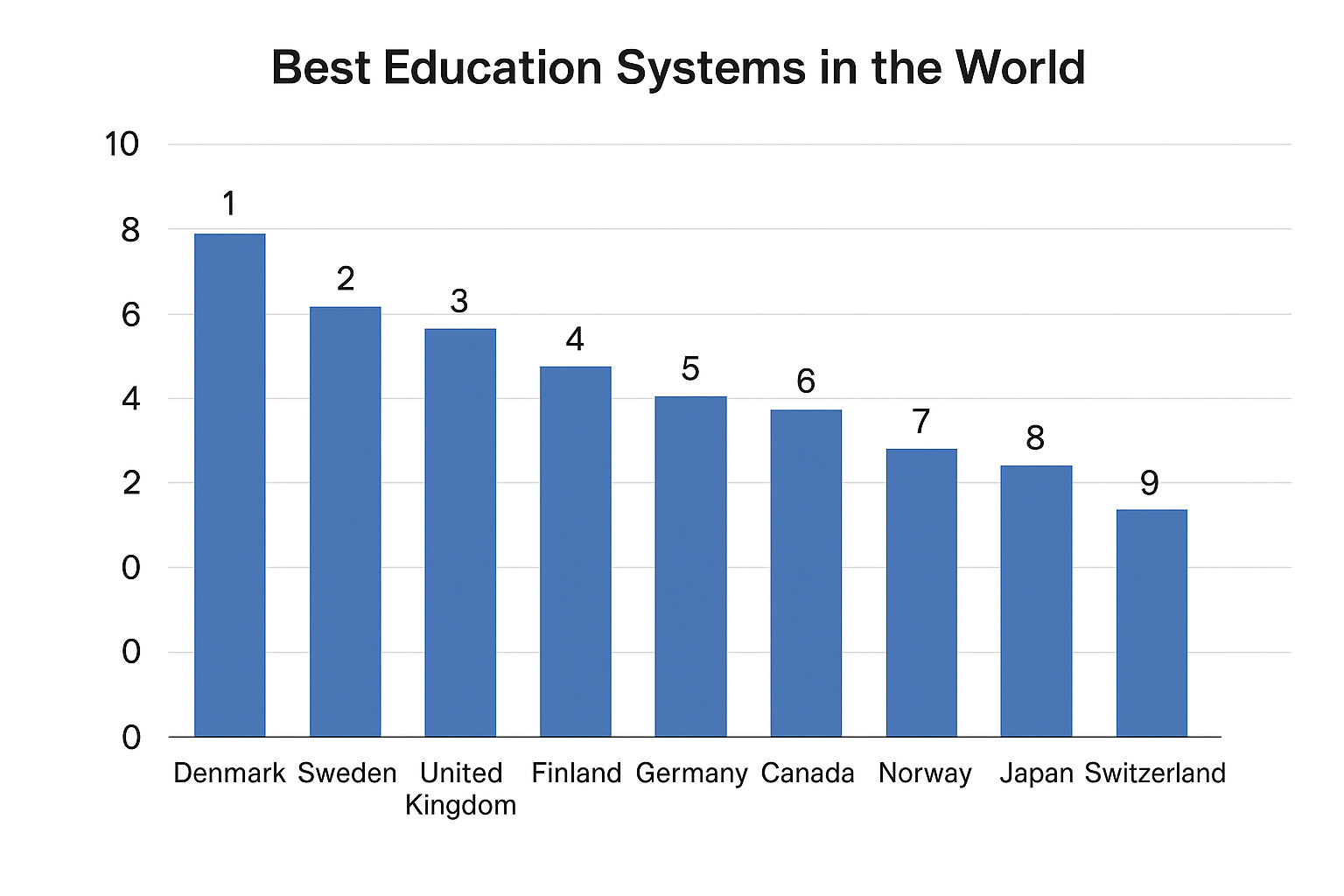
What Is Graduate Level Education?
What Is Graduate Level Education? A Complete Guide for Aspiring Postgrads
◆“Thinking about leveling up with a master’s or doctorate? Here’s exactly what graduate level education means—and how it can supercharge your career.”
Graduate level education refers to any advanced degree program you pursue after earning a bachelor’s—think master’s, doctoral, professional doctorates, or postgraduate studies. Unlike undergraduate work, grad school requirements focus on deep specialization: you’ll tackle rigorous coursework, original research or capstone projects, and close mentorship with faculty experts. Whether you’re weighing a master’s vs. doctoral path, understanding program prerequisites, or mapping out your academic milestones, this guide will walk you through everything you need to know about advanced degree programs—and why they’re the launchpad for higher salaries, leadership roles, and cutting-edge expertise.
Why Pursue Graduate Level Education in the US?
◆“I still remember the moment I realized my bachelor’s wasn’t enough—stuck in an entry-level role watching peers with master’s degrees zoom past me on the career ladder. That hit me: postgraduate studies weren’t just a checkbox, they were the key to unlocking the next level.”
Key Benefits
Higher earning potential
- On average, master’s degree holders in the U.S. earn 20–30% more per year than bachelor’s grads.
- (E.g., median annual salary for master’s in engineering: $95K vs. $73K for bachelor’s.)
Expert network & mentorship
- Access to faculty advisors, industry‐connected alumni, and peer cohorts.
- Many programs offer internship pipelines and exclusive research collaborations.
Specialized skill mastery
- Deep dive into niche fields—whether it’s data science, educational leadership, or clinical psychology.
- Hands-on projects and thesis work build both theoretical and practical expertise.
How to calculate your grad-school ROI:
- Estimate total program cost (tuition + living expenses).
- Project post-grad salary increase.
- Divide increased annual earnings by program cost.
- Look for a payback period under 5 years for strong ROI.
How Graduate Level Education Works: From Application to Graduation
Graduate school can feel like uncharted territory, but it really follows a clear, step-by-step progression—from zeroing in on the perfect program all the way through that triumphant diploma in hand. Below, you’ll find both the big picture and the nitty-gritty details, sprinkled with real-life insights from my own journey.
Finding the Right Graduate Program
Before you write a single admissions essay, you need to know exactly where you want to apply—and why. Start by asking targeted questions in your online searches: “Which grad programs have no GRE?” or “best part-time vs. full-time master’s in data science.” Look for
- Program accreditation: Is it regionally accredited, or does it have specialized recognition (e.g., AACSB for business)? That stamp of approval impacts both your learning experience and your resume’s credibility.
- Delivery format: You might prefer the energy of on-campus seminars, the flexibility of an online cohort, or a hybrid mix.
- Part-time vs. full-time track: I opted for a part-time, evening-only master’s because I was working full-time. That choice gave me hands-on experience during the day and academic rigor at night—although it did stretch my program length by a year.
◆“Here’s how I chose my alma mater: I built a spreadsheet comparing accreditation scores, assistantship availability, GRE-waiver policies, and post-grad employment rates. Narrowing from ten to my final two options saved me weeks of second-guessing.”
Application Essentials & Timelines
Once you’ve got your shortlist, create a timeline that keeps you on track and stress-free. A visual roadmap helps:
12–18 months before start date:
- Research faculty publications and connect on LinkedIn.
- Bookmark application deadlines and program prerequisites.
9–12 months before:
- Register (or apply for a waiver) for GRE/GMAT if required.
- Draft your Statement of Purpose—this is your narrative hook.
6–9 months before:
- Request official transcripts and three recommendation letters.
- Update your CV/resume with recent projects or publications.
3–6 months before:
- Refine essays and personal statements.
- Double-check each school’s supplemental questions (teaching philosophy, portfolio samples).
0–3 months before:
- Hit “Submit” well ahead of deadlines.
- Send polite status-check emails if you haven’t heard back.
Checklist:
- Official academic transcripts
- GRE/GMAT scores or waiver documents
- 2–3 recommendation letters from professors or supervisors
- Statement of Purpose & up-to-date resume
- Writing samples, portfolios, or research abstracts (field-dependent)
Coursework, Research & Thesis
Once admitted, the real adventure begins. Graduate level coursework is vastly different from undergrad lectures—you’ll participate in seminars, lead discussions, and tackle readings that assume prior knowledge. Here’s the typical progression:

Coursework (Year 1–2):
- Core seminars build foundational theories; electives let you specialize.
- I remember diving into advanced econometrics and staying up late debugging my very first regression model.
Comprehensive Exams (Mid-program):
- These high-stakes exams test your mastery across all core topics. Passing them earns you “candidacy” status.
Proposal & Research (Year 2–3):
- You’ll write and defend a thesis or dissertation proposal, outlining research questions, literature review, and methodology.
- My proposal defense was nerve-wracking—but getting that faculty approval felt like unlocking the final level of a game.
Data Collection & Analysis:
- Fieldwork, lab experiments, or archival studies depending on your discipline.
- I spent six months interviewing industry leaders for my thesis on supply-chain resilience.
Writing & Defense (Final months):
- Draft chapters, integrate advisor feedback, and polish your argument.
- The culminating defense—presenting your findings to a committee—was by far the proudest moment of my graduate career.
◆“For me, the thesis was the ultimate proof of expertise—I still get chills remembering the applause when I finished my defense.”
Core Types of Graduate Degrees Explained
Graduate-level credentials fall into three broad categories—each built for different goals, timelines, and career paths. Whether you’re aiming to deepen academic research, pivot into leadership, or enter a regulated profession, here’s how to choose the right degree for you.
Master’s Degrees (MA, MS, MBA, MEd, etc.)
Master’s programs typically last 1–2 years and blend coursework with a capstone project or practicum. They’re ideal if you want to specialize without committing to multi-year research.
◆Example: “What is an example of a graduate level master’s?”A Master of Science (MS) in Data Analytics combines advanced statistics, machine learning, and real-world projects to prepare you for roles in tech, finance, or healthcare.
Common Outcomes:
- Career Tracks: Data scientist, curriculum specialist, marketing manager, policy analyst
- Duration: Full-time: 12–18 months; Part-time: 2–3 years
- Skill Focus: Technical expertise, leadership foundations, applied research.
Related:
Best Digital Marketing Courses
Research Doctorates (PhD, EdD, DSc)
Research doctorates demand 3–6 years of original scholarship. You’ll progress through doctoral candidacy exams, proposal defenses, and a dissertation defense—demonstrating true subject-matter mastery.
◆Personal Insight:“Defending my thesis was the proudest moment of my career—after years of experimental setbacks, that final oral exam felt like crossing Everest’s summit.”
What to Expect:
Timeline:
- Coursework & seminars (Year 1–2)
- Comprehensive exams (Mid-program)
- Research & writing (Year 2–5)
- Dissertation defense
Professional Doctorates (MD, JD, PharmD, DNP)
Professional doctorates blend rigorous academics with hands-on training—often required for licensure in medicine, law, pharmacy, or nursing.
◆“Is an MD considered graduate education?”Yes—an MD (Doctor of Medicine) is a graduate-level professional doctorate combining clinical rotations, research electives, and board exams.
Top 5 Professional Doctorates by Salary Growth
| Degree | Median Early-Career Salary | 5-Year Growth % |
|---|---|---|
| MD | $210,000 | 25% |
| JD | $135,000 | 15% |
| PharmD | $120,000 | 18% |
| DNP | $115,000 | 20% |
| PsyD | $100,000 | 12% |
Each pathway offers unique rewards—choose the one that aligns with your passion, timeline, and long-term impact.
Related:
Graduate Level Education vs. Undergraduate: Key Differences
If you’re wondering whether “graduate” and “undergraduate” are just academic jargon—they’re not. They represent two very different stages of your educational journey. Whether you’re fresh out of high school or considering a master’s, understanding how these levels differ will help you set the right expectations.
And to clarify a common misconception:
👉🏼 No, 12th grade is not considered graduation in higher education.It’s the completion of secondary school. In most systems like the U.S., you become an undergraduate student when you enroll in college or university for a bachelor’s degree.
Undergraduate vs Graduate Level Education
| Aspect | Undergraduate (Bachelor's) | Graduate Level Education (Master’s/PhD) |
|---|---|---|
| Depth of Study | Broad-based, introductory | Highly specialized & focused |
| Class Format | Lecture-heavy, professor-led | Seminar-style, discussion-driven |
| Assignments | Exams, essays, group projects | Research papers, thesis, case studies |
| Learning Model | Knowledge absorption | Independent inquiry, critical evaluation |
| Duration | Typically 3–4 years | Typically 1–2 years (Master’s), 4–7 (PhD) |
| Admission Tests | SAT, ACT (optional in some cases) | GRE, GMAT, LSAT, MCAT (program-specific) |
| Output | General education + major | Academic credential or professional license |
| Mentorship | Limited professor interaction | Close faculty mentorship, research advisors |
◆“Grad school felt like switching from a map to GPS-guided exploration—every step was more intentional, yet required navigating uncertainty with confidence.”
Related:
What is post-seconday education?
Top 3 Signs You’re Ready for Graduate Level Education
🎯 You crave depth—not just knowledge, but mastery
- If you find yourself going beyond class requirements to explore subtopics, it’s a sign you're ready to specialize.
🧪 You’re driven by curiosity and independent research
- Grad school expects you to ask the questions—not just answer them. You’ll formulate problems, not just solve them.
📈 Your career goals demand advanced credentials
- Whether you’re eyeing a promotion, pivoting industries, or entering academia, grad school might be your launchpad.
Frequently Asked Questions
❓ What is considered a graduate level degree?
A graduate-level degree is any academic program pursued after a bachelor's degree. This includes master’s degrees (e.g., MA, MS, MBA), doctoral degrees (PhD, EdD), and professional doctorates (JD, MD, DNP). These programs involve advanced coursework, research, or clinical practice.
❓ Is 12th graduate or undergraduate?
No—12th grade represents the final year of high school and is considered pre-undergraduate. A person who has completed 12th grade is not yet an undergraduate or graduate student.
Visit: TheTutorBridge: One stop solution for K-12
❓ What is an example of a graduate level degree?
Examples of graduate-level degrees include:
- Master of Science (MS) in Computer Science
- Master of Business Administration (MBA)
- Doctor of Philosophy (PhD) in Psychology
- Juris Doctor (JD) in LawThese are pursued after completing a bachelor's degree.
Related
Discrete mathematics for computer science
❓ What is the meaning of graduation in education?
Graduation refers to the formal completion of an academic program, typically marked by a ceremony and the awarding of a diploma or degree—whether at the high school, undergraduate, or graduate level.
❓ What is the meaning of graduate education?
Graduate education is the pursuit of advanced academic or professional study beyond a bachelor's degree. It emphasizes deep subject specialization, critical research, and skill development for leadership or academia.
❓ Is 14 called graduation?
No—“14” usually refers to the grade level in some educational systems (such as the second year of college in a 16-grade structure). It is not synonymous with graduation, which specifically refers to receiving a diploma or degree upon program completion.
Advanced Tips for Grad-School Success
Graduate school is a high-stakes journey—intellectually rewarding but mentally taxing. It’s not just about being smart; it’s about working smart. The students who thrive are the ones who approach it strategically—with tools, frameworks, and support systems in place.
Here are some powerful, battle-tested strategies that helped me survive (and enjoy) the grad-school grind:
Time Management Frameworks That Work
Your to-do list will overflow unless you prioritize ruthlessly. One of the best tools I discovered in my first semester was the Eisenhower Matrix:
| Urgent | Not Urgent |
|---|---|
| Important | Do it now |
| Not Important | Delegate it |
- Use this matrix weekly to sort your assignments, readings, emails, and research deadlines.
- Pair it with time-blocking apps like Notion, Sunsama, or Google Calendar.
Tip: Assign colors to each quadrant in your planner to visualize your mental workload.
Leveraging Research Tools Like a Pro
Research is at the core of grad school, so mastering the tools makes life 10× easier.
- Set up alerts on Google Scholar for your thesis keywords—so you never miss new publications.
- Use Zotero or Mendeley to organize your sources and auto-generate citations.
- Use Connected Papers to map influential research related to your field.
- Install the Unpaywall extension to access free PDFs of paywalled academic articles.
💡 Pro Tip: Use Google Scholar’s “Cited by” feature to trace the impact of foundational studies and find updated data.
Building Your Cohort Community
Grad school doesn’t have to be a lonely academic marathon. Surrounding yourself with the right people can accelerate your learning and offer emotional support.
- Create a shared drive or Slack channel for notes, deadlines, and event updates.
- Organize monthly peer-review sessions to refine each other’s work.
- Don’t underestimate the power of casual meetups or virtual coworking calls to reduce burnout.
◆“In my second semester, our cohort started a Sunday Zoom brunch—we shared wins, vented frustrations, and swapped life hacks. It kept me sane.”
First-Semester Roadmap
Ideal infographic (horizontal or vertical):
- Week 1–2: Orientation, meet professors, explore library tools
- Week 3–4: Choose research direction & find accountability buddy
- Week 5–8: Midterm prep, lab/workshop participation
- Week 9–10: Thesis brainstorming begins
- Week 11–12: Advisor check-in, plan winter break reading
- Finals Week: Submit final papers & build Zotero archive
Would you like me to generate this visual timeline?
5 Must-Have Apps for Research Productivity
| App | Purpose |
|---|---|
| Zotero | Reference manager & citation tool |
| Notion | Workspace for notes & task tracking |
| Grammarly | Real-time academic writing improvement |
| Scrivener | Dissertation & long-form writing manager |
| EndNote | Advanced bibliography builder |
📌 Bonus: Combine Notion + Zotero using plugins to link research directly to project tasks.
With the right structure, support system, and tools, you’ll not only survive graduate school—you’ll thrive in it.
Beyond the Degree—Career & Lifelong Impact
Earning a graduate degree doesn’t just check a box—it rewires your thinking, expands your influence, and redefines your professional identity. Whether your next stop is a university lab, a corporate boardroom, or launching your own startup, graduate education is often the catalyst.
Let’s break down where your degree can take you.
Academic & Research Careers
If you’re driven by curiosity, peer-reviewed journals, and the thrill of discovering something no one else knows—academia might be your ideal path.
🧪 Common Roles:
- University Professor or Lecturer
- Postdoctoral Researcher
- Principal Investigator (PI) in labs
- Academic Journal Editor
- Policy Analyst at think tanks
🎓 Typical Next Steps:
- Publish research in top-tier journals
- Present at international conferences
- Apply for tenure-track roles or grants
Related: How students can make amazing presentation?
💡 Insider Note:
Many PhD graduates remain in academia for its intellectual freedom—but it also comes with competition, grant writing, and publishing pressure.
Industry Leadership & Management
A graduate degree can also fast-track you into strategic roles in the private or public sector—especially in tech, business, healthcare, and policy.
📊 Common Career Tracks:
- Product Manager (MBA, MS in UX/Design/CS)
- Data Scientist or Machine Learning Lead (MS/PhD)
- Public Health Administrator (MPH)
- Chief Marketing/Strategy Officer
- Director of R&D or Innovation
📈 Why it works:
- Advanced degrees signal thought leadership
- You’ll manage complex teams, projects, and high-stakes decisions
- You gain deeper problem-solving frameworks vs. tactical knowledge only
💬 Personal Story:
◆“After my PhD, I pivoted into corporate innovation strategy at a global consulting firm. It felt like I had gone from solving abstract problems to shaping billion-dollar decisions.”
Entrepreneurship & Consulting
Not all grad-school grads want to follow a linear path. In fact, some of the most influential founders, advisors, and consultants started with a graduate thesis and turned it into a movement.
Career Outcomes:
- Startup Founder / Co-founder
- Independent Research Consultant
- Think Tank Fellow or Policy Advocate
- EdTech or SaaS Entrepreneur
- Subject-Matter Expert (SME) for legal or government contracts
Graduate Advantage:
- Deep domain authority builds market credibility
- You learn how to research, pitch, and iterate—all core startup skills
- Your academic network becomes your first audience or customer base

Localized US Resources & Next Steps
Ready to turn plans into action? Below are top-tier, US-focused resources to help you pick the perfect program, secure funding, and plug into your professional community—no matter which coast you’re on.
Top public and private US grad schools by field
- Engineering & Technology: Stanford University (CA), Georgia Tech (GA), University of Michigan – Ann Arbor (MI)
- Business & Management: University of Pennsylvania (Wharton, PA), University of Chicago (Booth, IL), UCLA Anderson (CA)
- Education & Social Sciences: Harvard Graduate School of Education (MA), UC Berkeley Graduate Division (CA), University of Texas at Austin (TX)
- Health & Sciences: Johns Hopkins School of Public Health (MD), UCSF School of Medicine (CA), University of Washington (WA)
Major US-based fellowship & scholarship portals
- Fastweb: Comprehensive database of undergrad and graduate scholarships
- ProFellow: Listings of prestigious fellowships (Fulbright, NSF, Ford)
- Scholarship America: Nonprofit matching service for field-specific and regional awards
Regional networking groups
- American Marketing Association (AMA) Student Chapters: Active chapters in major metros—network with marketing pros and recruiters
- IEEE Graduate Student Affinity Groups: Chapter meetups in Silicon Valley, Boston, and New York for engineering research collaborations
- National Association of Graduate-Professional Students (NAGPS): Advocacy & virtual events connecting postgrads across the US
Conclusion
By now, you’ve seen what graduate-level education means, how it unfolds, and which degree path best fits your goals—whether you’re aiming for an MA to deepen your expertise, a PhD to pioneer new research, or a professional doctorate to unlock a regulated career. You’ve learned how to:
- Identify and apply to programs that match your budget, format, and timeline
- Navigate coursework, exams, and a thesis/dissertation with clear milestones
- Evaluate ROI through our tailored calculator and make data-driven decisions
- Tap into top-ranked US schools, scholarships, and professional networks for that crucial edge
Remember, graduate school is more than a credential—it’s a transformative experience that hones your critical thinking, expands your network, and positions you as an expert in your field.
◆“Taking the leap into grad school was the best investment I’ve ever made—both personally and professionally.”



